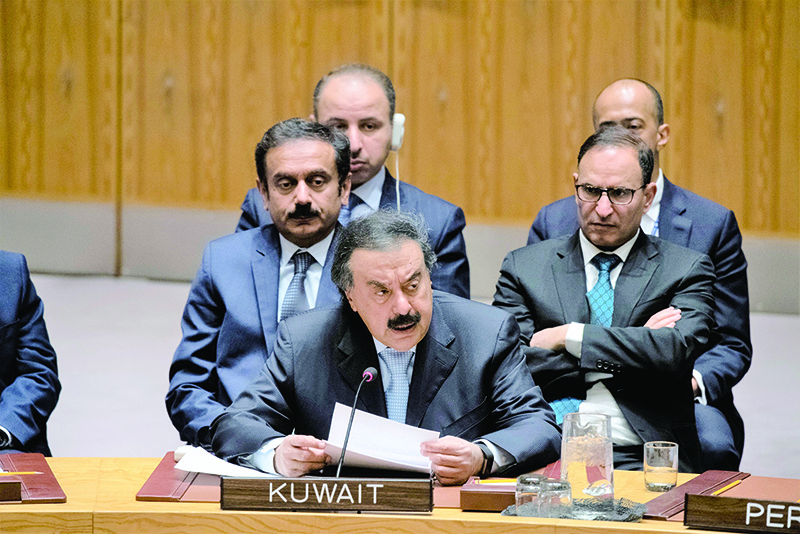
NEW YORK: Kuwait's Deputy Foreign Minister Khaled Al-Jarallah expressed his country's regret over the UN Security Council's failure to pass a draft resolution presented by Kuwait, Germany and Belgium to renew a mandate for the UN mechanism for cross-border aid delivery to Syrians. In statements to the press after the UN Security Council session on Friday, Jarallah expressed disappointment for the security council's failure to renew the required mechanism to provide aid for four million people in Syria who are in dire need for food and medicine. He unveiled that there were marathon negotiations carried out by the permanent Kuwaiti delegation in the UNSC with other member states to pass the draft resolution, "but unfortunately, we did not reach the desired result."
Russia and China used their vetoes Friday to block a UN Security Council resolution that would have extended for a year cross-border humanitarian aid to four million Syrians. Humanitarian aid currently flows into Syria through UN-designated checkpoints without the formal permission of the regime in Damascus, but that authority is due to expire on January 10. Germany, Belgium and Kuwait presented a resolution extending that authority for a year, winning the support of 13 council members but drawing the vetoes of Russia and China. Russia's ambassador to the United Nations, Vassily Nebenzia, said the latest resolution was "obsolete" because the authorities in Damascus have "retaken control of most" of Syria's territory. But the UN humanitarian relief department says the aid remains crucial as the situation on the ground has deteriorated over the past year and Syria is heading into winter.
Failure to compromise
The text vetoed Friday called for a one-year extension of the authorization to ship humanitarian relief supplies into Syria -- in effect since 2014 -- through three checkpoints, two in Turkey and one in Iraq. Hoping to overcome Russian opposition, the resolution's sponsors on Wednesday dropped a request for a fourth point of entry on the Jordanian border, which has hardly been used since 2018.
Earlier in the week, Russia offered a competing draft resolution calling for a six-month extension, but only via the two Turkish checkpoints. Put to a vote Friday, that proposal was rejected, with the United States, France, Britain, Poland, Peru and the Dominican Republic voting against. Germany, Belgium, Kuwait and Indonesia abstained.
"If you are so concerned about Syria, then why didn't you vote in favor of the Russian draft?" said the Chinese ambassador, Zhang Jun. But the British envoy, Karen Pierce, said that the vetoes showed an unwillingness to help Syrians. "There is time to sort it out if everybody is willing to do so," she said.
It was the second time in four months that Russia has vetoed a resolution dealing with the humanitarian situation in Syria. In September, Moscow used its veto against a resolution calling for a ceasefire in Idlib. That resolution also was sponsored by Germany, Belgium and Kuwait. Earlier Friday, the UN special envoy on Syria, Geir Pedersen, presented to the Security Council a grim picture as well on seeking a political solution in Syria. A long-awaited committee to form a new constitution for Syria met in October in Geneva, but Pedersen acknowledged there was little progress.
Humanitarian efforts
In his address to the UNSC, Jarallah had called on other council members to revitalize their support to humanitarian efforts in Syria. The crisis in Syria has not only affected the Middle East but has also reached further afield to threaten international peace and stability, he said and added that counterterrorism did not relieve any party of their obligations under international law. The Kuwaiti senior diplomat underscored that four million people rely on the cross-border mechanism for live-saving aid. He pledged to intensify efforts to renew the mechanism, calling on others to support this joint humanitarian responsibility. In addition, Syrians have been subject to flagrant violation of international humanitarian and human rights law, he indicated.
Furthermore, Jarallah said that Kuwait is keen on supporting the political process aimed at bringing upon a peaceful resolutions to the crisis in Syria. Describing the glimmer of hope resulting from the launch of the Constitutional Committee in Syria, Jarallah said it was the first step towards the implementation of council resolutions, including free and fair elections. Such efforts could, with the support of the Special Envoy, allow for agreement to be found in all areas, leading to a political solution that will retain Syrian sovereignty and territorial integrity. He expressed concern, however, over continued military operations. Confidence-building measures are necessary for political progress, including addressing the plight of those who have been detained, in accordance with Council resolution 2254 (2015), he added.
Accountability must also be ensured for serious crimes. He again condemned the targeting of innocent civilians by all parties, stressing that counter-terrorist activities cannot permit dodging obligations under international law. There must be a ceasefire across all of Syria. He also condemned Israeli violations of Syrian territory, stating that the Golan is Syrian Arab territory and its annexation illegal. He pledged Kuwait's continued full support to the Special Envoy's efforts in restoring peace in Syria, a country that is dear to Kuwait. - Agencies







